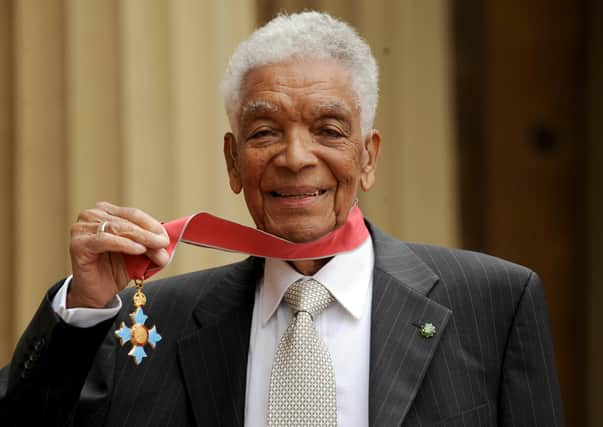Obituary: Earl Cameron CBE, Bermudian role model for Black actors on UK screens


If you saw a black man in a British film or television drama in the 1950s or 1960s, there is a fair chance it was Earl Cameron, a former merchant seaman from Bermuda who got stuck in London when the Second World War broke out and ended up becoming an actor by chance.
Most of those films and television shows are now all but forgotten – some lost forever in the BBC’s determination to reuse video tapes, though those early credits include one of Cameron’s most widely seen performances as James Bond’s local contact in the Bahamas in Thunderball, alongside the original 007, Sean Connery.
Advertisement
Hide AdAdvertisement
Hide AdCameron had a starring role in his very first film, playing a seaman who becomes romantically involved with a white woman in the 1951 film Pool of London, which was banned in his homeland Bermuda. And in the 1960s he appeared in a couple of Tarzan films and such iconic television series as Doctor Who, with the original Doctor William Hartnell, and The Prisoner.
Cameron retired from acting at the end of the 1970s, relocated to Guadalcanal in the Pacific and ran an ice-cream business. But his retirement proved temporary. He returned to Britain and his later years were to prove particularly fruitful. He played an artist painting a portrait of the monarch and expressing his dislike of Tony Blair in The Queen, with Helen Mirren; he was an African dictator in The Interpreter, with Nicole Kidman; and he had a small role in Inception with Leonardo DiCaprio, by which time he was in his nineties.
He was never a household name in the UK, but he was a role model for other black actors and was appointed a CBE in the 2009 New Year Honours. In his native Bermuda the City Hall Theatre in the capital Hamilton was renamed the Earl Cameron Theatre in 2012.
One of six children, he was born Earlston Jerusalem Cameron in Pembroke, Bermuda, in 1917. His father was a stone mason, who died when Cameron was just five. His mother worked in local hotels and he had several jobs in his teens and early twenties before joining the Merchant Navy.
In the early weeks of the Second World War he found himself stranded in London after missing his ship’s departure and was lucky to survive a bout of pneumonia and pleurisy. He was encouraged to recover by a nurse who told him that if he died she would be landed with the unpleasant job of writing to his mother. He subsequently worked as a dishwasher in the Lyons Corner House on The Strand.
Among his new circle of friends in London was Harry Crossman, one of several black actors who were in a West End musical comedy called Chu Chin Chow. One of the cast fell ill, they needed a replacement at short notice and Crossman suggested that Cameron might take his place, his main qualification being that he was black. “Half an hour later I was singing with no voice coming out, my knees trembling and sweat pouring down my face,” Cameron recalled. “I was terrible, but I thought ‘This is better than cleaning dishes. I’m now in showbusiness’.”
That led to work entertaining troops in India and the Netherlands and Cameron played the lead role in Deep Are the Roots in the West End and on tour, during which he met Patrick McGoohan, with whom he would work on Danger Man and The Prisoner, and Audrey Godowski, to whom he was married for 35 years before her death in 1994. In Deep are the Roots he played an American who returns to the US after the war and becomes involved in an interracial romance.
His debut film Pool of London featured a similar theme, this time in England. These were plots to which Cameron could readily relate, having married a white woman.
Advertisement
Hide AdAdvertisement
Hide AdThere were few black actors in Britain at that time. Cameron had taken elocution lessons, but it undoubtedly helped that his accent was Bermudian, meaning that directors could readily cast him as Americans or in more exotic roles, including roles in several films set in Africa. He had supporting roles in a string of earnest British dramas and a lead role, alongside Robert Shaw, as a London cabbie in the television play The Dark Man in 1960.
My earliest TV memories as a boy are of the Beatles, the Daleks, Robinson Crusoe and Earl Cameron on the police series Dixon of Dock Green, when he was locked up in a cell at the end and was screaming desperately. I found the scene very upsetting and the memory of it has stuck with me for more than half a century.
Unsurprisingly his early roles frequently highlighted racist attitudes. He often played articulate and intelligent characters surrounded by ignorance and prejudice. “I thought I had a responsibility not to play any sort of what they would call Uncle Tom parts,” he said.
He made a couple of films with African-American Oscar-winner Sidney Poitier, but was never tempted to try his luck in Hollywood, recalling that Poitier told him that when he started in films the only other black person on set was the shoeshine boy. “My wife was White-Jewish background and America at the time was full of racism,” he said.
Cameron adopted the Baha’i faith in the 1960s. He is survived by his second wife Barbara, five children from his first marriage and a son from an earlier relationship in Bermuda.
Brian Pendreigh
Comments
Want to join the conversation? Please or to comment on this article.